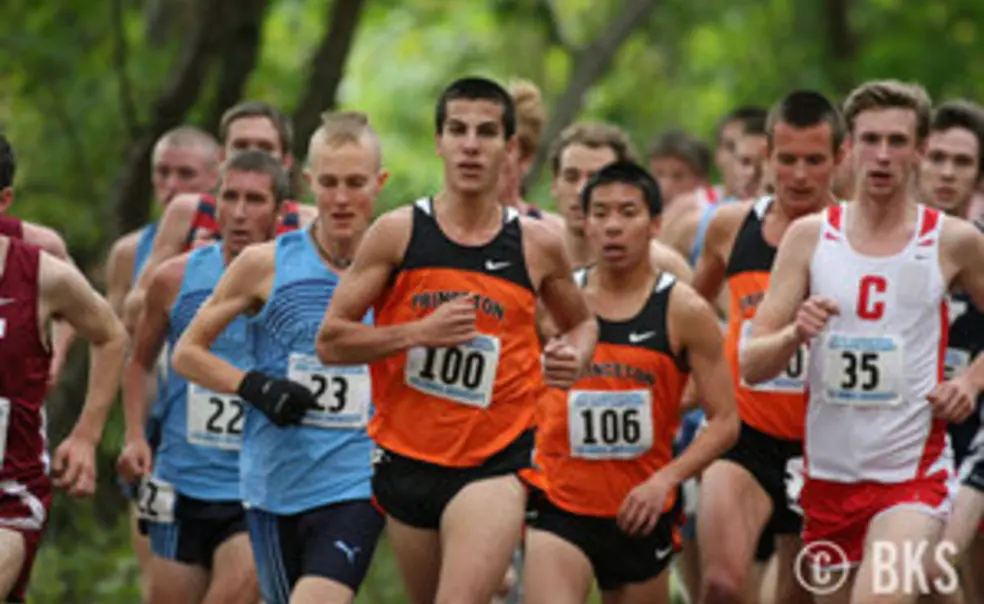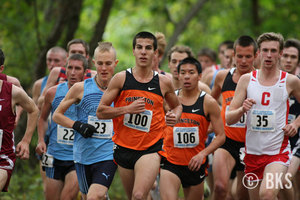Prep for Heps: Cross country teams to defend Ivy titles at home
Donn Cabral '12 and the Princeton men are ranked No. 9 in the country heading into the Ivy League Heptagonal Cross Country Championships. (Beverly Schaefer)
In recent years, the finish line of the cross country Heptagonal championships has been dominated by orange and black, as the Princeton men’s and women’s teams have combined to win nine of the last 10 titles. But this year, the entire course will have a Princeton theme – in a departure from tradition, the meet will be held at the Tigers’ own West Windsor Fields on Saturday, Oct. 29.
Running for the Ivy League championship at home will be a new experience for both teams. The Heps meet has been held at Van Cortland Park in the Bronx every year since 1981 for the women and 1979 for the men.
“We’ve done a lot more work on the course this year than we’ve ever done,” Donn Cabral ’12 said, explaining that not only is it the site of Heps, but the team’s other big races will be run on similar courses. “We’ve been getting used to the different parts of the race and how we’re going to attack each part.”
A home-course advantage for the Tigers is the last thing that the rest of the men’s field wants to see. Princeton has won four of the last five championships – losing to Columbia by the smallest possible margin in 2009 but reclaiming the title with a comfortable win last fall – and appears stronger than ever. The Tigers finished fourth in a field that included 21 of the country’s top 30 teams at the Wisconsin adidas Invitational and jumped up to No. 9 in last week’s coaches’ poll, their highest national ranking since 1998.
“We have a ton of confidence right now going into Heps, because we know that if everything goes as planned, we have some leeway,” Cabral said.
At the head of the Tigers’ pack is Cabral, who finished fourth in Wisconsin and will be trying to defend his title as the individual Ancient Eight champion. As a junior last fall, Cabral – despite feeling under the weather and a little bit “past his peak” in training – beat 2009 champion Dan Chenoweth of Harvard by more than 10 seconds, finishing with the second-fastest time in Heps history at 24:03.8.
Being the defending champion is no guarantee of success, as Chenoweth discovered a year ago. But Cabral’s expectations could not be higher for his final Heps meet.
“I’m just as confident about my individual chances at Heps as I am about the team’s chances,” he said. “For both of them, I think that we can have just a good day and still win. And having won last year, against a great runner who’s now graduated, is definitely giving me confidence this year.”
Purely from history, the women’s team should be even more confident – while the men were defeated two years ago, the women are five for their last five at Heps, winning every meet by more than 20 points. But after losing strong racers such as Sarah Cummings ’11 and Ashley Higginson ’11, the Tigers may have a tougher fight on their hands this year.

Alex Banfich '12, center, leads the Tiger women, winners of five straight Ivy Heps titles. (Beverly Schaefer)
The group of challengers will be led by Columbia, which was the last non-Princeton team to win the Heps title and has finished second in four of the last five years. The Lions finished 27th in Wisconsin, only two places and 28 points behind the Tigers. Cornell has not cracked the top three at Heps since 2006 but is another potential threat this year – the Big Red is the only Ivy League team in the national rankings, at No. 25.
“There definitely is a target on our back,” Alex Banfich ’12 said. “We recognize that the league as a whole is a lot more even this year, which is great – better competition only makes you a better runner.”
The Tigers do have the incoming favorite to win the individual title – Banfich finished 20 seconds clear of the field to win at Heps in 2010 after finishing second to Liz Costello ’10 the year before. The senior has shown no signs of slowing down, finishing fourth individually in a strong field at Wisconsin.
But the rest of the team has less experience, including a few former mid-distance runners that are not used to cross country races. Banfich said that the smaller field of Heps might help the team improve on its showings at Notre Dame and Wisconsin.
“Some of our runners aren’t used to being with millions of girls on the starting line. Having only a certain amount of teams – not 40, like in Wisconsin – will really work to our advantage, and we’ll be able to handle that a lot better,” Banfich said. “It can be intimidating, having all these highly ranked teams around and not having the experience to elbow through millions of girls at the starting line.”
Banfich said that the team’s goals on a national stage have changed a bit this year – the team is currently a longshot to notch a fifth straight top-15 finish at NCAAs – but the Tigers still do not want to let go of their Ivy League dominance, especially on a course that they “know every inch of,” according to Banfich. She also said that Princeton’s looming week of midterms, which leads up to Heps, will not be an issue.
“I’ve been trying to remind everyone to get on top of their work and sleep this week, but I don’t think it’ll be much of a disadvantage,” Banfich said. “Everyone’s ready for it – we’ve all been talking about it the last few weeks.”
While the women’s team has its sights solely on the Ivy League race, the men feel that they can afford to keep one eye on November, which includes regionals and the NCAA Championships. With Cabral flanked by fast runners like Brian Leung ’12, Peter Maag ’12, and Tyler Udland ’14, the Tigers have hope of surpassing last year’s program-best 12th-place finish at nationals.
“We can have an average day and win the meet, which allows us more flexibility in terms of training toward the very end of the season, regionals and nationals,” Cabral said. “If anything, we’re downplaying Heps a little bit, because we know that our goal is to be strong late in the season.”
Kevin Whitaker ’13 is an economics major and Daily Princetonian sports editor.














No responses yet